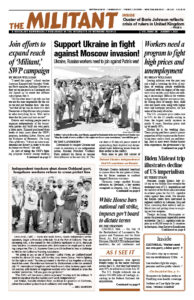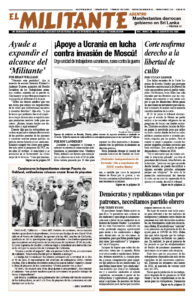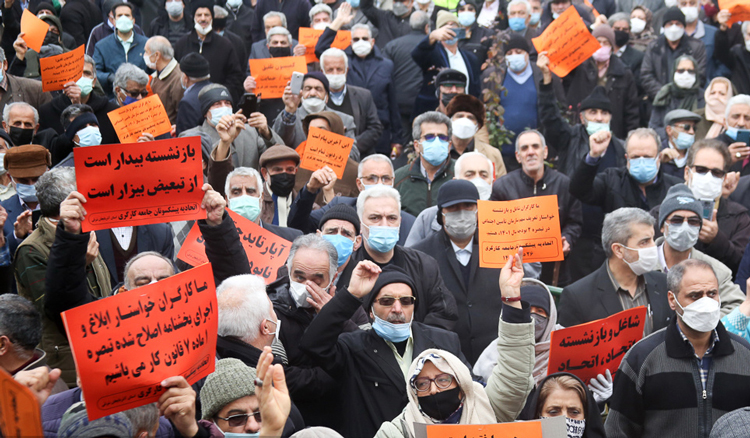Teachers across Iran have been stepping up their push to win wage and pension increases to keep up with inflation and to defend free public education. The value of the rial, the national currency, has plummeted 25% since late March. The arrest and prosecution of scores of teachers and union activists has not stopped their protests.
Thousands joined June 16 actions called by the Coordinating Council of Iranian Teachers Trade Union Associations. Demonstrations took place in Tehran, in the provinces of Mazandaran in the north, Kurdistan in the northwest, Khuzestan in the southwest, Hormozgan in the south, Kermanshah in the west, Azerbaijan in the extreme northwest, Gilan in north central Iran and several other regions.
The Coordinating Council brings together 20 government-recognized regional teachers’ unions. It was strengthened by their struggles starting in 2017.
In a June 16 statement, the council noted that Iranian President Ebrahim Raisi promised when he was elected a year ago that improving the conditions of working people “will not be tied to nuclear negotiations,” a reference to heavy U.S. sanctions on Tehran and ongoing talks with Washington over Tehran’s nuclear program.
Raisi also promised that he would create 1 million jobs, and 1 million housing units a year. “It didn’t take long for the promises to be forgotten,” the council said. “Instead of reducing the class divide and poverty, our government has targeted the livelihood of teachers and other wage earners.”
Over a decade ago Iran’s bourgeois clerical government passed legislation saying that public school teachers’ pay should be brought in line with their counterparts at the country’s universities. Last December, after a round of large teacher protests, the parliament approved a law saying teachers should get 80% of the salaries university professors make. But that law has not been implemented.
The highest paid teachers make under 90 million rials, about $300 a month, while the value of the rial-to-dollar exchange rate continues to fall.
Right to public education
Another issue has been protecting the right to free public education. To make up for budget shortfalls from the lack of promised government funding, schools are imposing tuition and other fees, despite this being a violation of Iran’s Constitution. This, teachers say, violates “the rights of 13 million students.”
Meanwhile, the government is pushing to hire thousands of Islamic religious seminary students to work as teachers, while graduates of approved teaching programs are having trouble getting jobs. Many teachers see this as an attempt to extend the imposition of religion over classes on science, history and literature, and to undermine the independence of the schools.
After demonstrations took place across the country in May, marking National Teachers’ Day, the government slandered the teachers, claiming they were being used by foreign powers and “Marxists” seeking to overthrow the Islamic Republic.
Iranian police arrested two French teachers, trade unionists who had been visiting Iran on tourist visas, who had met with leaders of the teachers’ unions. Cecile Kohler, president of the National Federation of Education, Culture and Vocational Training in France, and her husband were arrested on their way to the airport May 8.
In response, the Coordinating Council issued a statement saying “a part of the government, in an unscrupulous and cowardly act,” has falsely accused their teachers of being manipulated by “the invisible hands of foreigners.” Teachers have always been against foreign intervention in Iran, the council noted, calling the latest accusations “ridiculous.”
Dozens of teachers and union leaders in Iran have been arrested and slandered in the press, the council said. These attacks, the council said, violate the Iranian Constitution’s guarantee of the right to be considered innocent until proven guilty. The repression hasn’t pushed back the fight by teachers and other school workers.
Family members, friends, union members and others have organized to visit teachers imprisoned across the country and to shine a spotlight on the harsh conditions of their imprisonment, including beatings and torture in attempts to extract false confessions. Several of the imprisoned teachers have begun hunger strikes.
The council leadership has welcomed messages of solidarity from unions around the world, while making it clear that it won’t accept any funds from outside the country.
The Iran-based Ensaf News agency reported the Islamic Association of Students of Tehran University and Tehran Medical Science University issued a statement July 18 condemning the most recent arrests of teachers, as well as that of three well-known film directors and others. “Arresting citizens on charges of expressing an opinion or issuing a statement about current issues has no legal basis,” the students said. “The prevention of contact with their families” and other abuses “are clearly against the laws of the country.”
Retired teachers held marches and other protest activities around the country July 5. “We have no other goal than our professional demands,” retired teacher Ali Sadeghi told a protest of hundreds in Kermanshah. “We inform the security forces [surrounding us] that our protesters are Iranians, and Muslims. We are courageous and we have the right to fight for our rights.”
The following week Sadeghi and another leader of the retirees was summoned by the prosecutor’s office, a sign that the government is considering bringing charges.


